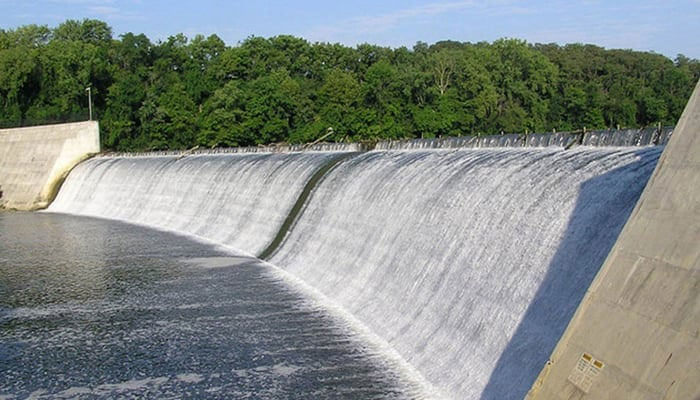Fiscal feuds
LAHORE: The country faces a deadlock on key national issues such as water management and fiscal federalism, as political parties and provinces refuse to compromise on their interests and adopt a rational approach.
Although we compromise on principles at the national level, we are surprisingly rigid on matters that could be resolved through consultations based on merit and logic. As a result, many resolvable issues remain unresolved due to entrenched attitudes.
The Kalabagh dam, for instance, is critically important as the country has now been classified among water-stressed nations. It could be built in three years to store 7 million acre-feet of water and produce much-needed clean power. The dam's absence hurts both KPK and Sindh—the two provinces that strongly oppose it. KPK's agricultural lands remain deprived of irrigation water as the Indus River flows well below the agricultural plains. The dam could lift the water to farm level. Sindh's mangroves are dying due to the lack of water flow during the nine-month pre-monsoon season, while over 17-35 MAF of water flows unused into the sea during the rainy months. A water reservoir could ensure regular irrigation of mangroves by releasing a small amount of water during the dry season, keeping the sea at bay and preserving the province's fertile lands. Unfortunately, the Kalabagh Dam has become a politically contentious issue, and reason has been drowned out by opposing voices.
The 18th amendment is another point of contention. Passed hastily through political bargaining, it included changes such as renaming NWFP to KPK and allowing a person to serve as prime minister for unlimited terms, removing the previous two-term limit. While there's no doubt that the provinces needed autonomy—which the amendment largely granted—in some areas, it overstepped the authority of the federal government.
The federal government is responsible for defense, foreign policy, and debt servicing, which even before the amendment accounted for over 60 percent of total revenues. Now, debt servicing alone consumes the entire federal government's revenue share. The 18th amendment increased the provinces' share in the federal divisible pool, as most departments were transferred to them. The federal government now receives only 40 percent of tax revenue, while the rest is distributed to the provinces, forcing it to borrow annually to manage day-to-day affairs.
Resource reallocation is necessary to ensure the smooth functioning of the federal government.
However, provinces are resistant to parting with their share. Sales tax on services, which holds significant revenue-generating potential, now falls under provincial jurisdiction, yet hundreds of services remain untaxed.
With goods taxes already largely in place, provinces could compensate for any reduction in their share from the federal divisible pool by expanding service tax collection.
The denial of a proper share of federal taxes perpetuates the federal government's reliance on loans for day-to-day operations, impeding national development. Yet, some provinces stubbornly oppose any amendments to the 18th amendment. They even resist the privatization of loss-making public sector enterprises operating in their regions, ensuring the financial burden continues to fall on the federal government. It is high time we embrace rational thinking and make decisions with a broader mindset, prioritizing the supreme interest of the nation.
-
 Andrew, Sarah Ferguson Refuse King Charles Request: 'Raising Eyebrows Inside Palace'
Andrew, Sarah Ferguson Refuse King Charles Request: 'Raising Eyebrows Inside Palace' -
 Adam Sandler Reveals How Tom Cruise Introduced Him To Paul Thomas Anderson
Adam Sandler Reveals How Tom Cruise Introduced Him To Paul Thomas Anderson -
 Washington Post CEO William Lewis Resigns After Sweeping Layoffs
Washington Post CEO William Lewis Resigns After Sweeping Layoffs -
 North Korea To Hold 9th Workers’ Party Congress In Late February
North Korea To Hold 9th Workers’ Party Congress In Late February -
 All You Need To Know Guide To Rosacea
All You Need To Know Guide To Rosacea -
 Princess Diana's Brother 'handed Over' Althorp House To Marion And Her Family
Princess Diana's Brother 'handed Over' Althorp House To Marion And Her Family -
 Trump Mobile T1 Phone Resurfaces With New Specs, Higher Price
Trump Mobile T1 Phone Resurfaces With New Specs, Higher Price -
 Factory Explosion In North China Leaves Eight Dead
Factory Explosion In North China Leaves Eight Dead -
 Blac Chyna Opens Up About Her Kids: ‘Disturb Their Inner Child'
Blac Chyna Opens Up About Her Kids: ‘Disturb Their Inner Child' -
 Winter Olympics 2026: Milan Protestors Rally Against The Games As Environmentally, Economically ‘unsustainable’
Winter Olympics 2026: Milan Protestors Rally Against The Games As Environmentally, Economically ‘unsustainable’ -
 How Long Is The Super Bowl? Average Game Time And Halftime Show Explained
How Long Is The Super Bowl? Average Game Time And Halftime Show Explained -
 Natasha Bure Makes Stunning Confession About Her Marriage To Bradley Steven Perry
Natasha Bure Makes Stunning Confession About Her Marriage To Bradley Steven Perry -
 ChatGPT Caricature Prompts Are Going Viral. Here’s List You Must Try
ChatGPT Caricature Prompts Are Going Viral. Here’s List You Must Try -
 James Pearce Jr. Arrested In Florida After Alleged Domestic Dispute, Falcons Respond
James Pearce Jr. Arrested In Florida After Alleged Domestic Dispute, Falcons Respond -
 Cavaliers Vs Kings: James Harden Shines Late In Cleveland Debut Win
Cavaliers Vs Kings: James Harden Shines Late In Cleveland Debut Win -
 2026 Winter Olympics Snowboarding: Su Yiming Wins Bronze And Completes Medal Set
2026 Winter Olympics Snowboarding: Su Yiming Wins Bronze And Completes Medal Set




